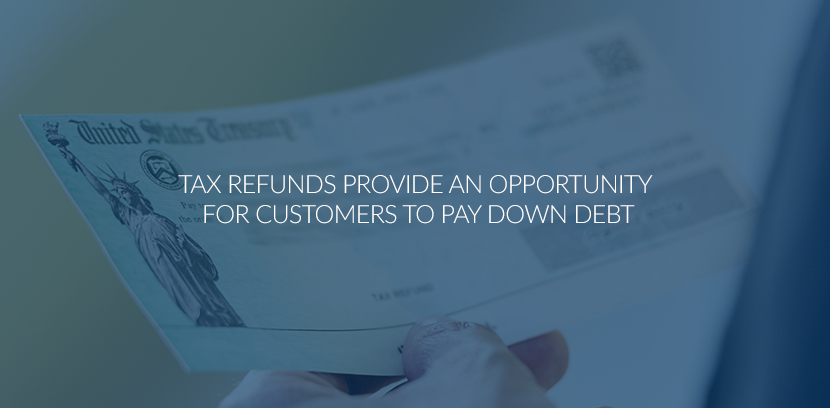
With credit card debt in America inching closer to $1 trillion, more consumers than ever are facing low or falling credit scores. For some, tax season means the possibility of a tax refund. While it's tempting for consumers to consider all the ways to spend the bonus influx of cash, a tax refund is a great way to begin paying down debt. In order to encourage your customers to use their refunds wisely, let's examine the effects of debt and what it could mean for your customers.
Why should your customers use their tax refund to pay down their debt?
Physical and Emotional Effects of Debt
Making minimum payments on credit cards each month can often feel like running on a treadmill. When medical debt can't be predicted or avoided, other bills begin piling up. Student loans can feel like an anchor that will never offer any release. When debt doesn't seem to be affected, no matter what payments are made, dread begins to set in every time the mail arrives. With dread comes fear, panic, anxiety, depression and often, in the case of overwhelming debt, denial. Denial causes more spending and the situation can deteriorate quickly. Stress, caused by debt or anything that feels out of control, affects the body in a myriad of ways including loss of sleep, binge eating or loss of appetite. Once the physical effects take a toll on the body, work, home-life or relationships can be affected as well.
Pay Down Debt: The Numbers
Since debt affects more than just credit scores and the ability to obtain loans for other purchases, many consumers are looking for some sort of debt relief. According to Bloomberg and a survey by the National Retail Federation, 35.5% of Americans who receive refunds this year will use the funds to pay down debt, an increase from the previous year. The same article cites that the youngest taxpayers are not only using refunds to pay down debt (33.2%) but they'll also add to their savings (58%).
Financial radio host Dave Ramsey breaks down the numbers for paying down debt with a tax refund using national averages:
- With a $30,000 student loan, at 6.2% interest, a borrower will pay on the loan for 10 years and pay more than $40,000. Using a tax refund of $2,800, the loan can be paid off 14 months sooner, saving $2,000 in interest.
- With $16,748 in credit card debt, at 15% interest rate, making minimum payments, a borrower will be paying on this debt for 14 years. Using the $2,800 tax refund, and increasing the monthly payments (to the average increase in income by changing tax withholding), the credit can be paid off in 21 months, saving $5,600 in interest.
These few examples show that a tax refund can make a big difference by decreasing the amount of interest paid over the whole of the debt and shaving off the amount of time to pay the debt. Consumers will also see a gradual increase in credit as well.
Encourage Financial Wisdom
Collecting from frequent late-paying or non-paying customers can be frustrating but a business can offer helpful tips to encourage financial wisdom. Late or non-paying customers are typically doing the best that they feel they can do. Often, they feel overwhelmed, have little understanding of how they found themselves with so much debt, or have a lack of financial literacy. As a creditor, your customers may appreciate any gesture of compassion, including helpful guidance in the direction of paying down debt. Asking customers to use their tax refunds wisely, in the end, creates the best customers for your business. Once your customers begin paying down debt, instead of spending the money on a vacation or something else, they may begin to change their spending and credit habits, including paying your bills on time. Share the good news with your customers: tell them about the opportunity to use their tax refunds to pay down and relieve some of the burdens of debt.
Learn more about BYL Collections



